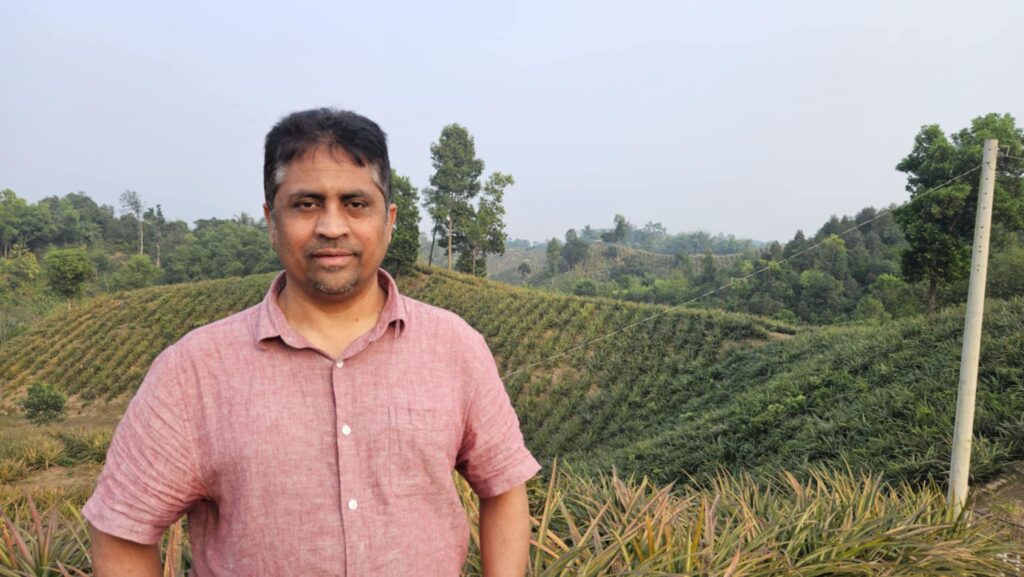Anwar Shahjahan, Pineapple Museum, Dhaka South: A silent agricultural revolution has begun in Golapganj, a traditional upazila of Sylhet. The lands that once lay fallow have now been developed into pineapple gardens, malta and orange gardens, coffee and cashew cultivation, as well as fish and cattle farms. Along with local entrepreneurs, expatriates are also investing in the agricultural sector, which is not only a personal profitable venture, but is also strengthening the economy of the region. #Unveiling new agricultural possibilities While talking to entrepreneurs during a recent visit to various fruit gardens, farms and fish farming centers in Golapganj, it was learned that 99% farmers and investors are benefiting from their initiatives. Many have started new projects on hundreds of acres of land or are planning to start in the future. “Abdul Matin Chand Mia Pineapple Garden” in Dattarail village was the first to start commercial pineapple farming. At that time, no one thought that pineapple cultivation would bring commercial success, but today, at least 10-12 pineapple gardens have been established following its path, including Alvilla Garden, Pineapple Museum and Bhai Bhai Pineapple Garden. Recently, "Lakeview Garden" is being built on 1,000 acres of land next to Golapganj Government Technical College and Golapganj Stadium, where there are various species of fruit trees as well as a fish farm.
#Good_Use_of_Natural_Resources_and_New_Style_of_Agriculture: The Surma and Kushiyara rivers flow through Golapganj, and there are numerous canals, rills, hills and low-lying lands. Although these uncultivated lands were once unused, agricultural entrepreneurs are currently converting them into fruit orchards and farms. Especially in the hilly and hilly lands, pineapple, malta, orange, cashew and coffee cultivation have become popular. These orchards are not only centers of fruit production, but are also opening new doors for agritourism. People are now visiting these orchards, eating fresh fruits and buying them directly from the orchards. #Rise_of_Fishery_and_Livestock_Farms Fish farming has long been known as a profitable business in Golapganj. Currently, there are about two hundred fish farms here, where large-scale production is being done using low-lying lands. Similarly, livestock farms have also increased significantly. Currently, there are more than a hundred cattle and goat farms here, where many are making a profit of crores of taka. In addition, chicken farms have also become quite popular, and entrepreneurs are earning lakhs of taka every month. As the supply from these farms is assured in the local market, it is also playing an important role in meeting the demand for meat. #Development of Agritourism Agritourism is becoming popular in the hilly areas of Golapganj. Although these lands were previously uncultivated, the scene has completely changed in the last two years. Pineapples, oranges, malta, lemons, cashews and coffee are now being cultivated in rows on the hills. Agrotourism is developing around the hills in Dattarail village. Most of the entrepreneurs are expatriates, who have developed rich gardens by utilizing wasteland. Now, some farmers are earning crores of taka a year just by selling pineapples.
#Potential_for_cultivation_of_turmeric_pepper_ginger_and_onion Despite the revolution in Golapganj's agriculture, the desired progress is not being seen in the cultivation of turmeric, chilli, ginger and onion. In particular, a large part of the onion demand in Bangladesh depends on imports from India. Although the fertile soil of Golapganj is suitable for cultivating these crops, farmers are not showing much initiative. If the government encourages this cultivation, local production will increase and the country's import dependence will decrease. #Government_support_needs_for_agricultural_development Government support is very important to make Golapganj's agricultural revolution sustainable. Government support can play an important role in the following areas in particular—
Training and technical assistance: Production will increase further if improved seed varieties are provided, modern agricultural technology is used, and proper training is provided in the use of pesticides.
Low-interest loan facilities: If farmers can be provided with easy-to-use loans, they will be able to invest on a larger scale.
Convenient market system: A developed market system is needed to preserve the produced products and sell them at a fair price.
Encouraging the cultivation of spices and vegetables: If the government provides incentives for the cultivation of turmeric, chili, ginger, and onion, local production will increase and the country's dependence on imports will decrease.
Development of Agri-Tourism: If a special policy is formulated for agri-tourism at the government level, it will become more popular at the local and national levels. #Golapganj_Agricultural_Development_Future If the agricultural revolution of Golapganj can be taken forward with proper planning and guidance, it will not only be the development of an upazila, but also an important milestone for Sylhet and the entire country. If the concentration of entrepreneurs, government support and the application of modern agricultural technology come together, the agricultural revolution of Golapganj will expand further and open the door to new possibilities. This silent agricultural revolution will not only enrich the economy of Golapganj, but will also set a new example in the agricultural sector of the entire country including Sylhet. Now there is a need for government support, policy support and more encouragement of farmers, so that this revolution is sustainable in the long term and plays an important role in the country's food security. Anwar Shahjahan: Editor of our daily and monthly London Bichitra



